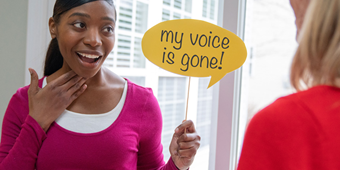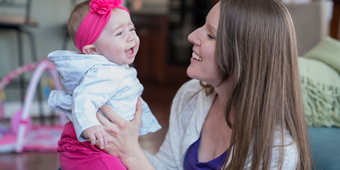Newborn Hearing Tests: Can You Hear Me Now?
Find Your Perfect Match
Answer a few questions and we'll provide you with a list of primary care providers that best fit your needs.
It’s important to identify hearing loss as soon as possible so that steps can be taken, if needed, to ensure your baby’s hearing and brain development.
Approximately 1 to 3 children out of every 1,000 babies born in the U.S. have hearing levels outside the normal range, says the American Academy of Pediatrics (AAP).
Most U.S. states require hearing screenings at birth, and more than 98 percent of all newborns in the U.S. get one before they leave the hospital, say the Centers for Disease Control and Prevention (CDC). Both the AAP and CDC recommend all babies get a hearing screening by the age of 1 month.
Common Hearing Screenings At Birth
Hearing screenings are quick and painless and can be performed while your baby is asleep.
Most hospitals use one or both of the following hearing tests:
Automated Auditory Brainstem Response (AABR). Clicks or tones are played through soft earphones into the baby's ears. Three electrodes resting on the baby's head measure how the hearing nerve and brain respond to sound.
Otoacoustic Emissions (OAE). This screen measures sound waves produced in the inner ear. A tiny probe is placed just inside the baby's ear canal. It measures the sound waves in the inner ear when clicks or tones are played into the baby's ears.
You’ll get the results of your baby’s hearing tests right away.
Ensure Your Child Gets Routine Hearing Checks
Most children pass their initial newborn hearing screening and don’t be alarmed if it takes 2 attempts. However, even if your baby passes the newborn screen, you should watch for signs of hearing loss as your child grows. Hearing loss can be gradual and hard to notice at first. Talk to your doctor about a hearing check if your child:
Doesn’t startle at loud sounds by 1 month old
Doesn’t turn toward sound at 3 to 4 months old
Concentrates on vibrating noises
Doesn’t enjoy being read to
Delays talking, is hard to understand or doesn’t say single words by 12 to 15 months old
Doesn’t respond when called
Hears some sounds but not others
Wants the TV louder than other family members
Has trouble holding his or her head steady or is slow to sit or walk unsupported
Even if your child shows no signs of hearing changes, make sure to get regular hearing checks at ages 4, 5, 6, 8, and 10. Additional screenings also are recommended in the teen years or any time there is a concern.
Children who are at risk for hearing loss from another condition such as Down syndrome, an infection or an injury should get at least one hearing test by the time they are 2 to 2-and-a-half years old. Your baby’s doctor will advise you on this.
Routine screenings can catch hearing changes early, when providing support and resources can have the most impact on your child's development.
Baby Failed the Hearing Screening: Now What?
Up to two out of every 100 babies do not pass the hearing screening at birth, even with two attempts. This does not mean that hearing damage is present. Fluid in the ears or too much noise in the room can impact results.
If your baby fails the hearing screening, more testing is needed. It’s important to get a full hearing test as soon as possible, but no later than 3 months of age, says the CDC. The hearing screeners will help you get a follow up test scheduled.
Follow-up testing is usually performed by an audiologist and includes a full hearing test and medical evaluation. The audiologist can perform different types of hearing tests to check for the degree and type of hearing loss. Options include:
Brainstem Auditory Evoked Response (BAER). Checks the brain’s response to sound. Because this test does not rely on a baby’s response behavior, the child can be asleep during the test.
Behavioral Audiometry Evaluation. Tests a person’s overall response to sound and the function of all parts of the ear. The child is awake and actively responds to sounds heard during the test.
The audiologist will talk with you about your child’s birth process and health and any hearing loss in the family. To ensure your child gets the proper care, your doctor may also share hearing test results with other doctors, including:
Ear, nose and throat specialist (otolaryngologist)
Eye doctor (ophthalmologist)
Genetics counselor or clinical geneticist
The sooner a hearing problem is found, the faster you can start to manage your child’s hearing loss and achieve the best outcome.
Hearing Treatments and Interventions
If your child is deaf or has hearing loss, treatment and interventions can begin right away.
Your child’s care team will include:
Pediatrician
Audiologist
Ear, nose and throat doctor who specializes in the ear
Genetic counselor to check if there is a hereditary cause for hearing loss
Pediatric ophthalmologist
You want to ensure your child’s vision is the best it can be. Many children who are deaf or hard of hearing rely on their vision for language input.
Children who receive hearing interventions by 6 months of age or sooner are more likely to achieve spoken language, says the AAP. If your child needs hearing aids or other technology, the CDC says getting fitted no later than 3 months old is key to language development.
Babies can be fitted with hearing technology as soon as six weeks after birth. Activating your baby’s auditory brain pathways ensures your child will not miss out on experiences needed for successful listening, talking and pre-reading skills, and early brain development.
Talk with your child’s doctor about access to other services for your child, such as:
Ohio’s Early Hearing Detection and Intervention program, which can provide resources
Individuals with Disabilities Education Act, which provides support for early intervention and school programming
Find Your Perfect Match
Answer a few questions and we'll provide you with a list of primary care providers that best fit your needs.
Source: Centers for Disease Control and Prevention; Hearing First.org; American Academy of Pediatrics




